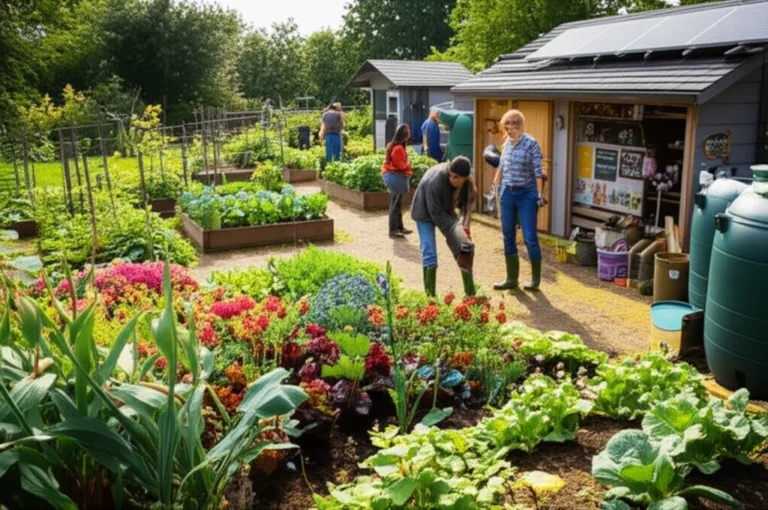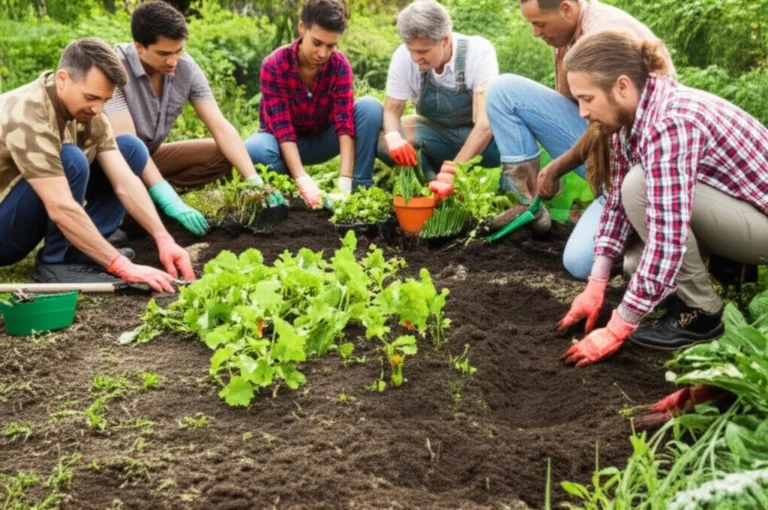Support our educational content for free when you purchase through links on our site. Learn more
Imagine turning your neighborhood garden into a buzzing hub of activity—not just for growing veggies, but for growing funds too! At Community Gardening™, we’ve seen community gardens transform from quiet green spaces into lively centers of education, celebration, and yes, revenue generation. Did you know that well-planned workshops and events can cover garden maintenance costs and even fund new projects? But how exactly do you make that happen without overwhelming your volunteers or losing the community spirit?
In this article, we’ll uncover 7 proven event and workshop ideas that help community gardens rake in revenue while fostering connection and learning. From composting classes to seasonal festivals, we’ll share insider tips, real-world success stories, and creative strategies to help your garden thrive financially in 2025 and beyond. Ready to cultivate cash flow alongside your crops? Let’s dig in!
Key Takeaways
- Workshops on gardening skills and cooking attract eager learners willing to pay or donate.
- Seasonal events like plant sales and harvest festivals boost both revenue and community engagement.
- Partnering with local businesses and sponsors amplifies resources and reach.
- Membership drives and donation campaigns turn garden visitors into loyal supporters.
- Social media and online platforms are essential tools for promotion and ticket sales.
- Diversifying income streams beyond events—like CSA shares and merchandise—strengthens financial stability.
👉 CHECK PRICE on:
- Gardener’s Supply Company Tools: Amazon | Gardener’s Supply Official Website
- Eventbrite (Event Registration): Eventbrite
- Master Gardener Programs (Expert Volunteers): Extension Master Gardener
Table of Contents
- Quick Tips and Facts About Community Garden Revenue Generation 🌱💰
- The Roots of Revenue: Understanding Community Gardens and Their Money-Making Potential 🌿💡
- 1. Hosting Workshops That Grow Your Garden’s Wallet: From Composting to Container Gardening 🥕🎓
- 2. Event Ideas That Bloom Profits: Seasonal Festivals, Plant Sales, and More 🌸🎉
- 3. Partnering with Local Businesses and Sponsors: Cultivating Community Support 🤝🌻
- 4. Membership and Donation Drives: Turning Garden Lovers into Garden Investors 🌼💖
- 5. Leveraging Social Media and Online Platforms to Boost Event Attendance and Revenue 📱🌍
- Creative Revenue Streams: Beyond Events and Workshops 🌟💡
- Case Studies: Successful Community Gardens That Made It Rain 💦💵
- Overcoming Challenges: Common Pitfalls and How to Avoid Them 🚧❌
- Tools and Resources for Planning Profitable Garden Events and Workshops 🛠️📚
- Conclusion: Cultivating a Thriving Community Garden Revenue Model 🌻💸
- Recommended Links for Community Garden Revenue Growth 🌐🔗
- FAQ: Your Burning Questions About Community Garden Revenue Answered ❓🌿
- Reference Links and Further Reading 📖🔍
Quick Tips and Facts About Community Garden Revenue Generation 🌱💰
If you’re wondering how community gardens can generate revenue through events and workshops, you’re in the right spot! At Community Gardening™, we’ve seen firsthand how a little creativity and community spirit can turn dirt and seeds into dollars and sense. Here’s a quick cheat sheet before we dig deeper:
- ✅ Workshops on gardening skills, composting, and cooking attract eager learners willing to pay a fee or donate.
- ✅ Seasonal events and plant sales can bring in significant funds while boosting community engagement.
- ✅ Partnerships with local businesses and nonprofits often lead to sponsorships or in-kind donations.
- ✅ Membership drives and donation campaigns turn garden lovers into financial supporters.
- ✅ Social media marketing is your megaphone to fill seats and sell tickets.
- ❌ Avoid overloading your volunteers—balance is key!
- ❌ Don’t forget permits and local regulations when hosting events.
For a deep dive into how community gardens make money, check out our related article How do community gardens make money?.
Ready to grow your garden’s revenue? Let’s get started! 🌿💵
The Roots of Revenue: Understanding Community Gardens and Their Money-Making Potential 🌿💡
Before we jump into events and workshops, let’s ground ourselves in what makes community gardens fertile ground for revenue generation.
Community gardens are more than just plots of land; they’re vibrant hubs of education, social connection, and sustainability. According to The Trustees’ Boston Community Gardens program, gardens impact over 18,000 people annually, showing the massive potential audience for your events. The Trustees manage dozens of gardens with thriving programs — a testament to how community gardens can be centers of activity and income.
Why events and workshops? Because they:
- Offer hands-on learning that people value and will pay for.
- Create community bonds that encourage donations and memberships.
- Provide opportunities for local vendors and sponsors to get involved.
Think of your garden as a living classroom and event space. With the right planning, it can bloom into a sustainable revenue source.
1. Hosting Workshops That Grow Your Garden’s Wallet: From Composting to Container Gardening 🥕🎓
Workshops are the bread and butter of community garden revenue. They’re educational, interactive, and can be tailored to your community’s interests. Here’s how to make them work for you:
Popular Workshop Topics
- Composting Basics: Teach attendees how to reduce waste and create nutrient-rich soil.
- Seasonal Planting: Help gardeners plan their crops for success.
- Container Gardening: Perfect for urban gardeners with limited space.
- Pollinator Gardens: Educate on attracting bees and butterflies.
- Cooking with Garden Produce: Combine gardening with culinary skills.
Baltimore’s GROW Center offers a great model, providing free composting and rain barrel workshops that attract participants and build goodwill. You can charge a modest fee or suggest donations to cover costs. Baltimore GROW Center Events are a great inspiration!
Step-by-Step: Planning a Workshop
| Step | Action | Tips |
|---|---|---|
| 1 | Choose a topic based on community interest and expertise. | Survey your members or social media followers. |
| 2 | Find an expert — local gardeners, master gardeners, or chefs. | Partner with organizations like Master Gardener programs. |
| 3 | Set a date and location within your garden or a nearby community center. | Consider weather and accessibility. |
| 4 | Promote your event via flyers, social media, and local newsletters. | Use engaging visuals and clear calls to action. |
| 5 | Prepare materials — handouts, tools, seeds, or compost bins. | Partner with brands like Gardener’s Supply Company for donations or discounts. |
| 6 | Host and engage — encourage questions and hands-on participation. | Make it fun and interactive! |
| 7 | Follow up with attendees for feedback and future events. | Build your mailing list for ongoing engagement. |
Benefits and Drawbacks
| Benefits | Drawbacks |
|---|---|
| Builds community knowledge and skills | Requires planning and volunteer time |
| Generates revenue through fees or donations | Weather can disrupt outdoor workshops |
| Attracts new members and supporters | Need to ensure safety and compliance with local rules |
2. Event Ideas That Bloom Profits: Seasonal Festivals, Plant Sales, and More 🌸🎉
Events are your garden’s party—and parties can pay! Here are some tried-and-true event ideas that bring in revenue and smiles:
- Spring Plant Sales: Sell seedlings, native plants, and herbs. The Trustees’ Boston gardens do this annually with great success.
- Harvest Festivals: Celebrate the season with food, music, and craft vendors. Charge admission or sell tickets for special activities.
- Garden Dinners: Host farm-to-table dinners using garden produce. These can be ticketed and attract foodies and supporters alike.
- Garden Tours: Offer guided tours for a small fee, showcasing your garden’s unique features.
- Seed Swaps and Sales: Encourage seed exchange and sell rare or heirloom seeds.
- Family Fun Days: Include games, face painting, and kid-friendly workshops with a small entry fee.
Tips for Successful Events
- Plan early: Secure permits and insurance if needed.
- Engage local vendors: Food trucks, artisans, and musicians can add value and share profits.
- Promote widely: Use social media, local papers, and community boards.
- Offer memberships or donations at the event: Make it easy for attendees to support your garden long-term.
3. Partnering with Local Businesses and Sponsors: Cultivating Community Support 🤝🌻
No garden is an island, and partnerships can be the fertilizer your revenue streams need! Local businesses, nonprofits, and even city programs often want to support community gardens because of their social and environmental benefits.
How to Attract Sponsors
- Create a sponsorship package: Outline benefits like logo placement, social media shoutouts, and event naming rights.
- Highlight your audience: Share demographics and attendance numbers.
- Offer in-kind sponsorships: Tools, plants, or refreshments can reduce your costs.
- Leverage local government programs: Many cities have grants or support programs like Baltimore’s GROW Center.
Real-World Example
The Baltimore GROW Center partners with Chesapeake Bay Trust and TreeBaltimore, providing workshops and resources that benefit both the garden and the partners. This symbiosis boosts credibility and funding.
4. Membership and Donation Drives: Turning Garden Lovers into Garden Investors 🌼💖
Memberships and donations are the lifeblood of many community gardens. Events and workshops are perfect opportunities to convert attendees into supporters.
How to Run a Successful Drive
- Offer tiered memberships: From basic plot renters to “Friend of the Garden” levels with perks.
- Provide tangible benefits: Discounts on workshops, early event access, or branded merchandise.
- Make donating easy: Use platforms like PayPal, Venmo, or dedicated fundraising sites.
- Tell your story: Share how funds support garden improvements, education, and community programs.
According to The Trustees’ guidelines, garden dues help maintain plots and fund community programs, showing how membership fees are foundational.
5. Leveraging Social Media and Online Platforms to Boost Event Attendance and Revenue 📱🌍
You can’t sell tickets if no one knows about your events! Social media is your megaphone, and online platforms are your ticket booth.
Best Practices
- Create event pages on Facebook and Eventbrite: Easy registration and reminders.
- Use Instagram and TikTok: Share photos, videos, and stories showcasing your garden’s vibe.
- Engage influencers: Local gardening bloggers or community leaders can amplify your reach.
- Post testimonials and success stories: Real voices build trust and excitement.
- Use hashtags: #CommunityGardenEvents #GrowTogether #UrbanGardening
Tools to Consider
| Platform | Purpose | Features |
|---|---|---|
| Facebook Events | Event promotion and RSVP tracking | Free, integrates with Messenger |
| Eventbrite | Ticket sales and registration | Paid and free options, analytics |
| Visual storytelling | Stories, reels, hashtags | |
| Mailchimp | Email marketing | Newsletters, segmentation |
Creative Revenue Streams: Beyond Events and Workshops 🌟💡
While events and workshops are fantastic, don’t stop there! Here are some creative ideas to diversify income:
- Community-supported agriculture (CSA) shares: Sell weekly boxes of garden produce.
- Garden merchandise: T-shirts, tote bags, seed packets with your logo.
- Renting space: Host private parties, photo shoots, or yoga classes in the garden.
- Crowdfunding campaigns: For specific projects like building a greenhouse or installing rain barrels.
- Cooking classes or pop-up cafés: Use garden produce to create unique culinary experiences.
These ideas can complement your events and workshops, creating a robust financial ecosystem.
Case Studies: Successful Community Gardens That Made It Rain 💦💵
Let’s get inspired by some real-world success stories:
| Garden Name | Location | Revenue Strategy | Outcome |
|---|---|---|---|
| The Trustees Boston Gardens | Boston, MA | Plant sales, workshops, garden dinners | Over 18,000 people engaged annually, sustainable funding |
| Baltimore GROW Center | Baltimore, MD | Free workshops with sponsorship, pop-up events | Strong community ties, resource distribution, growing attendance |
| Golden Hill Community Garden | Bristol, UK | Outdoor cob oven events, community meals | Increased membership, vibrant community culture |
These gardens prove that with passion and planning, community gardens can thrive financially while enriching their neighborhoods.
Overcoming Challenges: Common Pitfalls and How to Avoid Them 🚧❌
Every garden faces hurdles. Here’s how to dodge common pitfalls:
- Volunteer burnout: Rotate responsibilities and keep events manageable.
- Weather woes: Have backup indoor locations or rain dates.
- Regulatory red tape: Check local permits, insurance, and health codes early.
- Marketing misfires: Start promotion early and use multiple channels.
- Financial transparency: Keep clear records and communicate openly with your community.
Remember, every challenge is an opportunity to learn and grow stronger!
Tools and Resources for Planning Profitable Garden Events and Workshops 🛠️📚
Equip yourself with these handy tools and resources:
| Resource | Description | Link |
|---|---|---|
| Master Gardener Programs | Expert volunteers and educators | Extension Master Gardener |
| Eventbrite | Event registration and ticketing | Eventbrite |
| Gardener’s Supply Company | Gardening tools and supplies | Gardener’s Supply |
| Local Government Grants | Funding opportunities for community projects | Check your city’s official site |
| Social Media Scheduling Tools | Buffer, Hootsuite for managing posts | Buffer |
For more inspiration on events and workshops, explore our Community Garden Events category and dive into Benefits of Community Gardens for why your efforts matter!
👉 CHECK PRICE on:
- Gardener’s Supply Company Tools: Amazon | Gardener’s Supply Official Website
Ready to turn your community garden into a thriving hub of education, fun, and revenue? Keep reading for the conclusion and actionable next steps!
Conclusion: Cultivating a Thriving Community Garden Revenue Model 🌻💸
Well, we’ve journeyed through the fertile fields of community garden revenue generation, and what a harvest of ideas we’ve gathered! From engaging workshops that teach composting and container gardening, to seasonal festivals and plant sales that bring the community together, your garden can absolutely become a vibrant hub of learning and income.
The key takeaways?
- Events and workshops are your bread and butter for revenue, but they also build community and education.
- Partnerships with local businesses and nonprofits amplify your reach and resources.
- Memberships and donations turn casual visitors into invested supporters.
- Social media and online tools are indispensable for promotion and ticketing.
- And don’t forget to diversify your revenue streams with creative ideas like CSA shares or pop-up cafés.
We opened the loop on how to avoid pitfalls like volunteer burnout and regulatory hurdles — remember, planning and communication are your best tools to keep things running smoothly.
So, is it worth the effort? Absolutely! With passion, planning, and a sprinkle of community magic, your garden can flourish financially while enriching your neighborhood. Ready to get growing? 🌱💰
Recommended Links for Community Garden Revenue Growth 🌐🔗
Looking to gear up for your next event or workshop? Here are some top products and resources to help you succeed:
-
Gardener’s Supply Company Tools:
Amazon | Gardener’s Supply Official Website -
Eventbrite (Event Registration & Ticketing):
Eventbrite -
Master Gardener Programs (Expert Volunteers & Educators):
Extension Master Gardener -
Books to Inspire Your Garden Events:
FAQ: Your Burning Questions About Community Garden Revenue Answered ❓🌿
What are some creative ways to host events in a community garden to attract new members and generate income?
Creative events go beyond the typical plant sale or workshop. Think garden-themed movie nights, pop-up farm-to-table dinners, or seasonal craft fairs featuring local artisans. Incorporating interactive elements like scavenger hunts or garden art installations can make events memorable and shareable on social media, boosting attendance. Hosting family-friendly activities ensures a wider audience, and partnering with local musicians or food vendors adds value and revenue-sharing opportunities. The goal is to create experiences that resonate emotionally and socially, encouraging attendees to become long-term supporters.
How can community gardens partner with local businesses to offer workshops and classes that benefit both parties?
Partnerships thrive when there’s mutual benefit. Community gardens can offer venue space and access to a targeted audience interested in sustainability and gardening. Local businesses, such as garden centers, organic food stores, or eco-friendly brands, can provide expertise, sponsorship, or in-kind donations like tools and seeds. Co-hosted workshops can be promoted jointly, expanding reach. For example, a local nursery might sponsor a “Spring Planting 101” workshop, providing plants and expertise, while the garden handles logistics and promotion. This collaboration enhances credibility, reduces costs, and creates cross-promotion opportunities.
What types of workshops and events are most likely to draw in crowds and generate revenue for a community garden?
Workshops that combine practical skills with immediate takeaways tend to be popular. Composting, container gardening, pollinator-friendly planting, and edible landscaping are perennial favorites. Cooking classes using garden produce also attract food enthusiasts. Events tied to the seasonal calendar—like seed starting in early spring or harvest festivals in fall—capitalize on natural interest peaks. Additionally, family-oriented events and those with a social or cultural component (music, art, food) broaden appeal. Charging a modest fee or suggested donation, especially when paired with tangible benefits like take-home plants or recipe booklets, boosts revenue.
Can community gardens offer membership models or sponsorship opportunities to support their events and workshops throughout the year?
Absolutely! Membership models create a steady income stream and deepen community ties. Offering tiered memberships—from basic plot rentals to premium “Friend of the Garden” levels with perks like discounted workshops or exclusive events—caters to different supporters. Sponsorships from local businesses or foundations can fund specific events or infrastructure improvements. Creating clear sponsorship packages that outline benefits (logo placement, social media shoutouts, event naming rights) makes it easier to attract and retain sponsors. Transparency about how funds are used builds trust and encourages ongoing support.
How can community gardens handle logistical challenges like permits, insurance, and volunteer management for events?
Navigating logistics is crucial. Start by checking local regulations for permits related to gatherings, food sales, or alcohol if applicable. Many municipalities offer guidance or even support for community events. Insurance may be required to cover liability; partnering with local nonprofits or city programs can sometimes provide coverage or advice. Volunteer management benefits from clear role definitions, training, and scheduling tools like SignUpGenius or Trello. Recognizing volunteers with appreciation events or perks helps maintain morale and commitment.
Reference Links and Further Reading 📖🔍
- The Trustees Boston Community Gardens – A model for community garden programming and revenue generation.
- Baltimore GROW Center | Baltimore City Department of Public Works – Inspiring workshops and events that support community gardening.
- Extension Master Gardener Program – Expert resources and volunteer networks.
- Gardener’s Supply Company – Tools and supplies for community gardens.
- SeedMoney Blog on Communal Cooking and Eating Areas – Insights on integrating cooking spaces into gardens for community and revenue.
- Eventbrite – Platform for event registration and ticketing.
Ready to turn your community garden into a flourishing hub of education, fun, and sustainable revenue? Let’s get growing! 🌻💚





